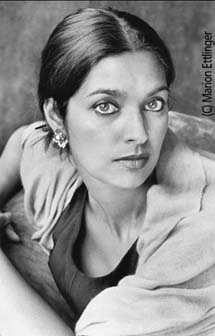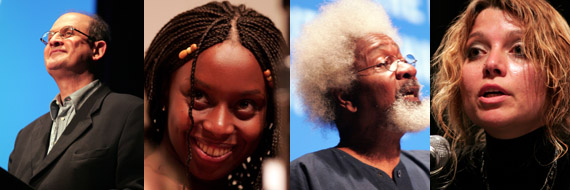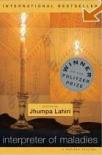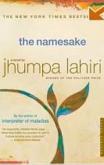Jhumpa Lahiri on PEN's World Voices

I met Jhumpa Lahiri when she read from her novel, The Namesake , at KGB Bar as part of the Sunday Night Fiction Series along with Susan Choi (author of American Woman). Jhumpa arrived carrying her firstborn wrapped in a blanket followed by her husband who was carrying a generous supply of baby paraphernalia. Patrons of KGB are used to being in the presence of prize-winning authors reading from their latest work, so what was it about Jhumpa that caused the silent but collective: hush, she's here, as she entered the room? One guess is that she has the presence and graciousness of an Indian princess, not to mention the fact that she is a charismatic and compelling reader.
After her reading we spoke just briefly. With one eye on her child, and the other on the business at hand, I felt her pull of responsibilities. I thanked her for taking time out of her demanding schedule to come and read at KGB. She smiled, exhaled, and with both eyes attentively focused on the past, she spoke nostalgically of KGB Bar specifically and of the Lower East Side in general as places where she and Susan met to exchange and discuss their writings. So many things have changed in her life since then: she published Interpreter of Maladies, which won the Pulitzer Prize, published The Namesake, and is now married with two young children and living in Brooklyn. This e-mail interview begins with an inquiry into her latest new project.
Suzanne Dottino: You've recently been elected to serve as Vice President of PEN. What are you hoping to accomplish in your role?
Jhumpa Lahiri: I've always admired the work of PEN. I was honored to become a member and even more honored to be elected to its board. In my term as vice president so far, I've had the opportunity to observe more closely the remarkable range and relevance of PEN's programs. I hope, in whatever way I can, to support PEN's mission and its many activities around the world.
SD: Has Salman Rushdie or other writers influenced you to play a more visible, and political role, when writers in this country usually have not stepped into these kinds of roles?
JL: I don't see myself playing a political role, but I do think that it's vital to contribute to a broader understanding of freedom of expression and of cultural tolerance and exchange, especially given the extent to which these values have been threatened in recent times.
SD: One of PEN's principle missions is to defend free expression, something that's not only relevant but also crucial in today's global state of affairs. "Faith and Reason” is a provocative theme for PEN International New Voices Festival. What's to be learned in its exploration and perhaps more practically speaking, what impact can writers truly have to make inroads in cultures where free speech has never been valued? What can literature do to ensure that that freedom isn't eroded in others?
JL: The fundamental impact any writer can have on the world is to write honestly and well. And in order to aspire to write in such a way, the writer must be able to express himself or herself in an absolutely uncensored, unhindered environment, and to obey no authority other than what the work demands. This is true in any culture, and for all literary traditions.

SD: Your novel, The Namesake, is being made into a film directed by Mira Nair, (Vanity Fair, Monsoon Wedding) with a screenplay by Sooni Taraporevala (screenwriter of Mississippi Masala, Salaam Bombay). You are also an actress in the film! What's the experience like of being on the set and seeing your novel brought to life in another medium?

JL: I'm an extra in the film--I don't think that qualifies as acting. My entire family and many members of my extended family in India also appear briefly on screen. It gives the film a very personal quality for me. I had never been on a film set and was utterly fascinated by the process. I have never been able to watch a movie since then without thinking about what a tremendous effort it is to create the final illusion of a finished film. I've seen a rough cut of The Namesake and love it. Mira understood my book completely, and she also made the story completely her own.
SD: Your writing has focused a great deal on the experiences of first and second generation children of Indian immigrants, on the vagaries of assimilation and a general feeling of dislocation in two worlds. You're a mother raising two children yourself now. What do you imagine your children will write about and how will their themes and ideas differ from your own?
JL: Your question seems to assume that my children will write! In any case, their experience of immigration and assimilation will be yet another step removed from my own. They may be curious about their immigrant history or they may not. It's difficult to predict. I happen to think a lot about this sort of thing, but I know other people of a similar upbringing who think about it less. Writers tend to dig deeply into their lives and to confront the mess. My guess, and my hope, is that my children will be conscious of both sides of their family history, and that they will always be accepting and respectful of those traditions. But they won't face the same issues I did. When I was growing up my parents never felt at home here, but my husband and I think of America as our home. I felt a great deal of confusion. I hope my children will feel enriched and not confused.

SD: Has the filmmaking experience inspired you to write screenplays, or do you think it will influence the way you may approach a novel or short story in the future?
JL: Writing a screenplay seems like an entirely different beast. For the time being I have my hands full with fiction. And my children.
SD: The titles of your works are deceptively simple yet highly evocative. At what point in the writing process do you choose a title, how do you generally come up with it and which title has meant the most to you personally?
JL: Titles emerge in all sorts of ways, sometimes before a story is written, sometimes in the process of writing it, and sometimes long after the writing is done. Often it's a phrase lifted out of the story. I think I will always be partial to the title "Interpreter of Maladies", as it was a title I thought of many years before I wrote the story, having no idea what the story would be about. It was an example to me of how the imagination can work, sometimes literally at a snail's pace.
SD: What are the events and/or people from your own life that taught you the most about writing?
JL: I learned a great deal from a wonderful teacher, Leslie Epstein at Boston University. But mainly I learn from the example of other writers.
SD: Who are the writers that inspire you most? What are you working on?
JL: Tolstoy, Chekhov, Virginia Woolf, William Trevor and Mavis Gallant are some of the writers I turn to again and again. I am currently working on another collection of stories.
PEN WORLD VOICES: APRIL 25 -30!
Visit for more information: http://www.pen.org
 Jhumpa Lahiri was born 1967 in London, England, and raised in Rhode Island. She is a graduate of Barnard College, where she received a B.A. in English literature, and of Boston University, where she received an M.A. in English, M.A. in Creative Writing and M.A. in Comparative Studies in Literature and the Arts, and a Ph.D. in Renaissance Studies. She has taught creative writing at Boston University and the Rhode Island School of Design. Her debut collection, Interpreter of Maladies, won the 2000 Pulitzer Prize for fiction. It was translated into twenty-nine languages and became a bestseller both in the United States and abroad. In addition to the Pulitzer, it received the PEN/Hemingway Award, the New Yorker Debut of the Year award, an American Academy of Arts and Letters Addison Metcalf Award, and a nomination for the Los Angeles Times Book Prize. Lahiri was awarded a Guggenheim Fellowship in 2002. The Namesake, published in September 2003, is Jhumpa Lahiri's first novel. She lives in New York with her husband and two children.
Jhumpa Lahiri was born 1967 in London, England, and raised in Rhode Island. She is a graduate of Barnard College, where she received a B.A. in English literature, and of Boston University, where she received an M.A. in English, M.A. in Creative Writing and M.A. in Comparative Studies in Literature and the Arts, and a Ph.D. in Renaissance Studies. She has taught creative writing at Boston University and the Rhode Island School of Design. Her debut collection, Interpreter of Maladies, won the 2000 Pulitzer Prize for fiction. It was translated into twenty-nine languages and became a bestseller both in the United States and abroad. In addition to the Pulitzer, it received the PEN/Hemingway Award, the New Yorker Debut of the Year award, an American Academy of Arts and Letters Addison Metcalf Award, and a nomination for the Los Angeles Times Book Prize. Lahiri was awarded a Guggenheim Fellowship in 2002. The Namesake, published in September 2003, is Jhumpa Lahiri's first novel. She lives in New York with her husband and two children.
